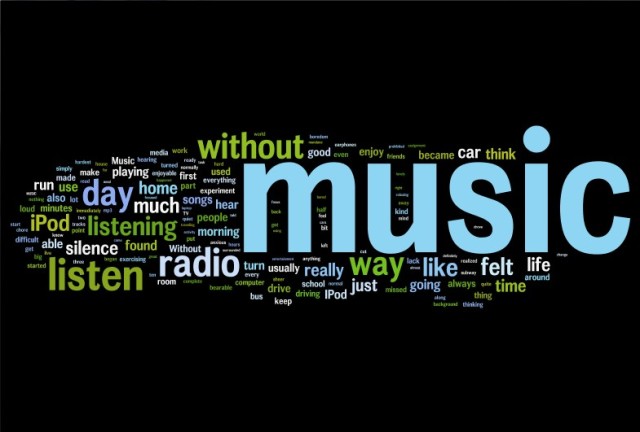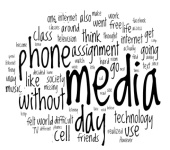“I could hear more sounds around me when I was walking on the street, because I wasn’t listening to the music from my iPod. However, without listening to my favorite music the whole day really made me feel depressed.” — Hong Kong
HIGHLIGHTS
- Music regulates students moods: Students across the world reported that they use music to stay happy as well as to relax. They dislike silence, and can even find it oppressive.
(Click for further details.)
- MP3 players deliver a soundtrack to students’ lives. Music both enhances – and shuts out – the environment in which they exist: Many students reported that they require music to be able to study, enjoy being with friends and even sleep. As one student from Hong Kong noted: “When I am alone, I usually prefer loud music that shuts the world away from me.”
(Click for further details.)
 Living in silence is depressing: Across the world, students reported that they depend on music to not only make their commutes to school and work more tolerable, but to regulate their moods.
Living in silence is depressing: Across the world, students reported that they depend on music to not only make their commutes to school and work more tolerable, but to regulate their moods.
From America and Europe to Asia and the Middle East, students, and especially student travelers, choose to entertain themselves with music. Regardless of whether they were in their rooms, in a car, on a bike, or on foot, students everywhere found it challenging to do anything and go anywhere without music in their ears. Many said life without music made them feel sad and stressed; some even tried to make their own music out of desperation.
“I can’t imagine life without music. No music — no life.” — Slovakia
- China: “I like enjoying music. It is my way to share the happiness and sorrows. The reason why I can keep smiling often is that I listen to music to relax. When I read books tiredly, music is a good way to upgrade my efficiency. When I run, music is a good way to enjoy the process of running. When I feel great pressure, music is a good way to ease my burden. Music is my true friend from the bottom of my heart.”
- USA: “I learned that music is a big part of society, and is a way to gather a crowd or group of friends. A day without music is so extremely difficult because how many people do you know that don’t listen to music?”
- UK: “My life suddenly became very silent as my iPod and iTunes were out of bounds, as was my radio, so I resorted to attempting to make my own music with my guitar.”
- Lebanon: “Nevertheless, I realized how dependent I am to music! I was going nuts in the car without music. I tried singing to myself but that was not so helpful.”
- Slovakia: “The hardest thing for me was that I wasn’t able to listen to the music. I’m addicted to music, so it was really terrible for me. I didn’t like the silence, which was everywhere.”
“I came back with a university partner, who isn’t exactly a close friend, who drove me home. He was turning the radio on to listen to some music and I told him about this experiment and he understood, so he shut it off. We talked for some minutes and then we stayed in silence.
The silence was like an infinity, and I thought how different this situation would be if the music was on. I felt awkward, like if I was forced to keep on talking. I was anxious to get home fast; the silence was killing me.” — Chile
- UK: “As soon as Lotte (the baby) got in the car she kicked off. This is rare for her but she has been teething badly lately and the vibrations from the car seem to trigger it. The first thing I would normally do is reach for the iPod and put on ‘Lotte’s Playlist’. This is not an option. If I was to do this not only would I be ruining the experiment for myself but more importantly the three other people in the car. There is nothing we can do but endure the screaming.”
- USA: “I rode my bike to school and right away I was already dreading the day because I couldn’t listen to my iPod on the ride over – something I have definitely become accustomed to. But I was determined to complete the assignment.”
Music is EVERYWHERE: Of all the different forms of media, music is one of the most omnipresent, yet also one of the most unnoticed. From country to country, students admitted they take music for granted and accept it as background noise in their life. They didn’t realize that music plays in bathrooms, in dining halls, or even on the radio in their cars, until they did this assignment.
iPods and the radio have become so integrated into daily lives, that the students reported that they had no idea how often they turn music on, or how sound in general pervades their day-to-day tasks. Many students reported that they require music to be able to study, relax and even sleep – and the regular noise of the world around them is not a compensation.
- Hong Kong: “The inescapable media were all music. I enjoyed my tea time with a friend and the house music of the restaurant was unavoidable…. I must admit that I did not escape from one situation with music though. That was the music of fashion boutiques. When it comes to shopping, of course the style and quality of clothes affect one’s decision of entering or not. But the power of music should not be undervalued too…I entered a boutique only because it was playing a song of Super Junior, one of my favorite Korean boy bands.”
- Chile: “Just as I started to tidy up my bedroom, I unconsciously turned on my iPod and started to listen to music. After two or three songs, I realized that the iPod was also prohibited for the experiment. I immediately put the iPod in my drawer and felt bad, because I was putting all of my effort into make the experiment work, and this unconscious mistake made me ruin everything.“
- China: “The need of music made me feel dull. Because listening to music has became my custom when reading books and sleeping, everything became impossible today. Compared with having no Internet, having no music made me more fidgety. I could not fall asleep quickly, like the child without the mother’s lullaby. At this time, when I read a book, I could not concentrate and always was bothered by factors of the external world.”
“After the class ended, three of my classmates (who were also part of the experiment) and I went to have lunch at the university cafeteria and sitting there was pure comedy. Every time someone played a song, we’d act like we were deaf.” — Lebanon
- United Kingdom: “I can hear the neighbour’s music, but unlike most days, I can’t drown it out with my own until he gets the hint. The bass makes it hard to focus.”
- Lebanon: “On my walk back to my place, I had hoped that without my headphones, I would hear the LIFE of Hamra’s streets. I didn’t. I just heard lots of cars and honking.”
- Chile: “I left my earphones and iPod at home, this way when I was on the bus, for the first time I realized the bus’ breaks squeaked, the other cars honk the horn a lot and how loud the people talked. I was used to listening to my music and disconnecting from the world that surrounded me. This bothered me; I wasn’t used to such loud acoustic contamination.”
“One of the most appealing aspects of music is its ability to make the most mundane of tasks bearable.” — USA
“Life is so boring without music”: Students all over the world also mentioned their belief that life without music was not just quiet, but was boring and frustrating. Students around the world reported that they normally use music as calming background noise, to motivate them to exercise, and to get them through otherwise-boring tasks, such as cleaning, laundry, and cooking.
- Lebanon: “I went to the gym at 6:30 and of course, exercising without my iPod was a bit annoying because I kept getting bored and distracted without any upbeat music to motivate me. I stopped after 45 minutes and went back home to shower.”
- China: “On the way back to my hotel, I felt bored and it was noisy. I needed some music, but, of course, I did not turn on my mp3; I just wore my headphones (psychological implications? Who knows!).”
- Slovakia: “We were traveling in Presov, which means 3 hours in a car without radio. Unbelievable! The trip was horrible for me because I could not listen to music. The worst was that I limited my parents too, so we were talking the whole way.”
Quotes may have been edited to regularize spelling and grammar.






